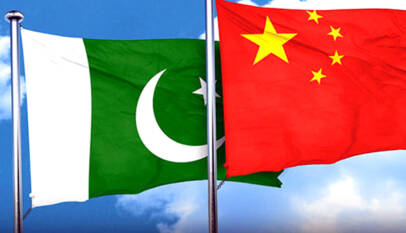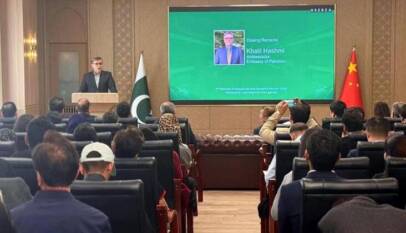Experts and new Afghan leadership highlight CPEC’s importance
Afghanistan under its new leadership has expressed eagerness for China’s involvement in reconstruction and rebuilding efforts in the country. Earlier, the foreign ministers of China, Pakistan and Afghanistan held a trilateral dialogue and agreed to enhance mutual connectivity and push the extension of CPEC to Afghanistan. Experts also believe that development projects under CPEC will help boost Afghanistan’s exports, which will help revitalize the country’s economy. Recently, Afghanistan became the first country to benefit from Gwadar trans-shipment trade as the country imported 43,000 tons of fertilizers via the port.
As officials from China, Pakistan and Afghanistan revealed an inclination to extend the China-Pakistan Economic Corridor (CPEC), a flagship Belt and Road Initiative (BRI) project into Afghanistan, experts said that such projects could help boost Afghanistan’s exports, which is conducive to the country’s journey of peace, but the feasibility of the project depends on whether the Afghan government and Taliban forces can reach a consensus on protecting overseas investment.
Although no concrete progress has occurred when it comes to the project, it seemed that the political leaders of the countries involved in the project all expressed a supportive attitude toward China’s investment in Afghanistan.
A government official and deputy spokesperson for the president of Afghanistan told media recently that the country’s president had “instructed authorities to facilitate necessary cooperation” in certain areas between China and Afghanistan. She made the comments as a number of Chinese firms were reportedly poised to pump $400 million into a coal-fired electricity generation project in the war-ravaged nation.
On the other side, Taliban spokesman Suhail Shaheen said in a recent interview with the South China Morning Post that they “welcome” China’s assistance in reconstruction and development of Afghanistan with the departure of US troops, calling China “a friend to Afghanistan.”
Among such cooperation, the potential extension of CPEC seems to be the one project that has caught the most attention globally, particularly after the US withdrew military forces from Afghanistan and demands surged for reconstructing the country.
Previously, the foreign ministers of China, Pakistan and Afghanistan held a dialogue in September 2019. They agreed then that the three countries should increase mutual connectivity and push the extension of CPEC to Afghanistan, China’s foreign minister Wang Yi disclosed.
Boost economy
Zhou Rong, a senior researcher at the Chongyang Institute for Financial Studies at Renmin University of China, said that if the CPEC is extended into Afghanistan, China could help build or improve infrastructure between Afghanistan and Pakistan to facilitate their economic exchange.
One project he particularly mentioned is the highway between Peshawar and Kabul, which he said is being built but is not qualified and wide enough for transport.
“China can help build bypasses to that road, as well as expanding relevant customs to make the connectivity between Afghanistan and Pakistan smoother,” Zhou told the Global Times on Monday.
With such infrastructure facilities, goods manufactured in Afghanistan will manage to find their way into the abundant markets in Pakistan, which Zhou said is important because only when Afghan people manage to make some money first and have their buying powers can the economic interaction between the two countries develop in a healthy direction.
He also said that Chinese companies could help invest in energy infrastructure in Afghanistan such as building electricity plants and water irrigation channels. Those completed, then cooperation could be enhanced to a further stage such as the construction of processing areas and industry parks in the two countries’ neighboring areas, where overseas capital can be directed in.
Liu Ying, a senior BRI researcher, also told the Global Times that the CPEC has apparent positive spillover effect in the reconstruction process of Afghanistan.
“Connectivity embodied by BRI will facilitate the flow of goods and people and via CPEC’s key transportation routes, and it is not hard to see that Afghanistan’s post-war reconstruction, industrial and digital buildup and economic growth could benefit,” Liu said, adding that CPEC’s industrial parks, many invested by Chinese investors, could provide the goods and products needed by reconstruction process in Afghanistan.
According to Liu, such economic construction, with benefits including the addition of local jobs, will be “conducive to the country’s security and its journey to peace.”
Afghanistan has become the first among several landlocked Central Asian countries to benefit from using the Chinese-invested Gwadar Port in Pakistan in transshipment trade. In 2020, the country imported 43,000 tons of fertilizers via the port, contributing to its agricultural development.
There have also been precedent efforts in tapping for the potential of Gwadar Port as a deep-water port that may open a coveted sea trade option for landlocked Central Asian countries for exports.
In May, Uzbekistan, one of the world’s leading cotton exporters, sent a high-level delegation to the Gwadar Port to look for logistics opportunities that might help it export its cotton.
A Chinese executive at the port told the Global Times on Monday that the Gwadar Port will “definitely play a major role” in the reconstruction of war-torn Afghanistan after the situation in the country stabilizes.
“However, at the moment, the situation in Afghanistan is severe, and the Pakistan government is also concerned that any security spillover from the country could impact the local security situation,” the executive said.
Time not ripe
Zhou stressed that the push of such projects could only happen when the internal political status of Afghanistan is stable enough for overseas investment to proceed without safety hazards.
But this seems to be increasingly difficult considering Afghanistan’s current political situation. According to media reports, the Taliban is rapidly retaking land across Afghanistan as the US missions remove its troops outside of the country.
“Who should we talk with to push the project? And can the two sides reach an agreement not to ruin the project no matter which side seizes the land where the project is based?” Zhou questioned. “The trend of CPEC extending into Afghanistan is trend that must happen, but the time is not ripe now to push the project,” Zhou said.
According to experts, China has been investing in Afghanistan in multiple forms, but the cooperation has already borne the brunt of Afghanistan’s political chaos as well as the pandemic hit.
“As far as I know, the number of Chinese investors in Afghanistan are less than 300, which are primarily made up of large companies like Huawei and ZTE. There’s also China town and Confucius Institutes in there, but apart from those there seems to be none (Chinese elements),” Zhou said.
According to him, although it’s not likely that a single project like CPEC could directly improve the peaceful process of Afghanistan, it might help stimulate both Taliban and the current Afghan government to agree on the protection of certain infrastructure projects from military warfare for the country’s own good, and the projects can in turn benefit the country’s economy.
“It would be a virtuous cycle,” Zhou said.
Pakistan Embassy in Beijing launches landmark mentorship programme to empower youth
The Embassy of Pakistan in Beijing on Sunday successfully organized the 2nd Pakistan Profe…











